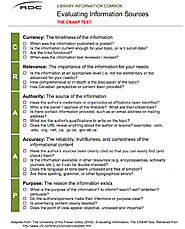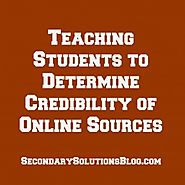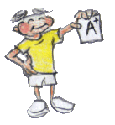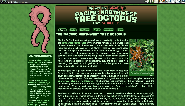-
About
- About Listly
- Community & Support
- Howto
- Chrome Extension
- Bookmarklet
- WordPress Plugin
- Listly Premium
- Privacy
- Terms
- DMCA Copyright
- © 2010-2025 Boomy Labs

 Aysin Alp
Aysin Alp
Listly by Aysin Alp
Resources to evaluate websites and the quality of content

Julie Coiro Associate Professor of Education at the University of Rhode Island An essential part of online research is the ability to critically evaluate information. This includes the ability to read and evaluate its level of accuracy, reliability and bias. When we recently assessed 770 seventh graders in two states to study these areas, the results definitely got our attention.
Vaughan Memorial Library, Acadia University Copyright © 2004-2008 The Governors of Acadia University. All rights reserved.Requirements for use

Criteria for Examination | Technical Strategies for Evaluating Web Sites | Internet Credibility Sites Criteria for Evaluating Information on the Internet (PDF) Author or sponsor of the site. Qualifications and reputation of author/source. The authority and reputation of the source of the information will depend on the expertise, reputation and status of the source.

When you need to do research, the World Wide Web is a great resource. Here are some steps to help you use the Web for your research.
![How to Determine Website Credibility [Rubric]](http://media.list.ly/production/183987/1227308/item1227308_185px.jpeg?ver=2314704793)
Our World Wide Web is a living, breathing, and constantly expanding phenomenon. We often wonder how much information is being produced, and infographics like this one from Domo can give us a fairly solid visual idea of what's being created and uploaded regularly.

A resource of educational iPad and Android apps for teachers, educators, and students

Two important revolutions have come together to make online source credibility testing an important skill to teach our students: The Common Core emphasizes research and informational texts. Our students have incredible access to online sources.

Cybrary Man's Educational Web Sites The internet catalogue for students, teachers, administrators & parents. Over 20,000 relevant links personally selected by an educator/author with over 30 years of experience.
Get lesson plans and student handouts to offer lessons that help students learn how to apply critical thinking skills when doing research online.

So much of reliable sources in internet searches is the same as researching in the library. Pick: primary sources unbiased sources sources with the background and training required to understand and present information Young students have difficulty with these rules. They work hard just to maneuver through a search engine, the links, the search bar and the address bar.

Intermediate Grades may use this rubric for evaluation purposes. Go to the printable version.

Anyone can have a web page, and anyone on the Internet can say they are an expert. Valid and reliable websites meet basic criteria. Check out Joyce Valenza's two systems of evaluation. Use the...

ReadWriteThink couldn't publish all of this great content without literacy experts to write and review for us. If you've got lessons plans, videos, activities, or other ideas you'd like to contribute, we'd love to hear from you. Find the latest in professional publications, learn new techniques and strategies, and find out how you can connect with other literacy professionals.
Introduction to fake websites Librarians and educators need to be able to illustrate to students and users alike that websites cannot always be trusted to provide truthful and accurate data. This page provides examples of websites that are full of lies, inaccuracies or false information - either for amusement or for more worrying reasons.

How do I evaluate the quality of websites? How can I teach students to evaluate websites? Where can I find checklists for evaluation? There's lots of good information on the Internet, but you will also find opinions, misconceptions, and inaccurate information. How do you judge the quality of Internet resources?

Impart vital information literacy skills to your students.

Content curation is "...the process of collecting, organizing and displaying information relevant to a particular topic. Teacher content curation can be used by students and students can be asked to show expertise with examples of curation." In my 8th grade ICT class we will be completing webquests on content curation as a teach method of introducing students to "Content Curation."...

Common Core State Standards & Finding Credible Sources Common Core Standards require that students are able to find sources when doing research and analyze them for credibility.

In this lesson students learn how to create well-defined search strings and to use tools and techniques such as bookmarking, browser filters and search engine preferences to avoid unwanted material.

In this lesson students learn how to authenticate online information by comparing "facts" from the website www.allaboutexplorers.com with more authoritative sources.

This four-lesson unit on search skills and critical thinking teaches students how to target and specify their online searches to avoid unwanted results, how to judge whether a link, search result or website is legitimate or phony, and how to find legitimate sources online for media works such as music, videos and movies.

In this lesson, students apply their searching and critical thinking skills to learn how to find legitimate online sources for downloading and streaming movies, music and videos.

In this lesson, students use a Web-based activity to help them think critically about how to determine the quality of Web resources.

Featured Resources From Theory to Practice Research has shown that online reading requires not only traditional comprehension strategies, but also new digital- and media-literacy strategies. In this lesson, students learn how to use these comprehension strategies involving a sequence of planning, predicting, monitoring, and evaluating.
